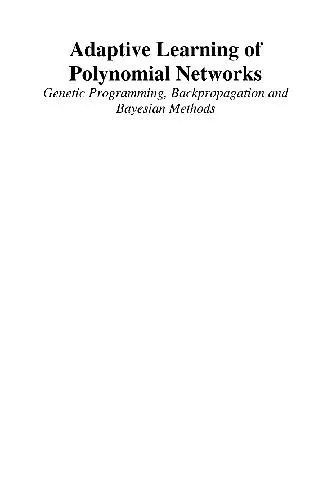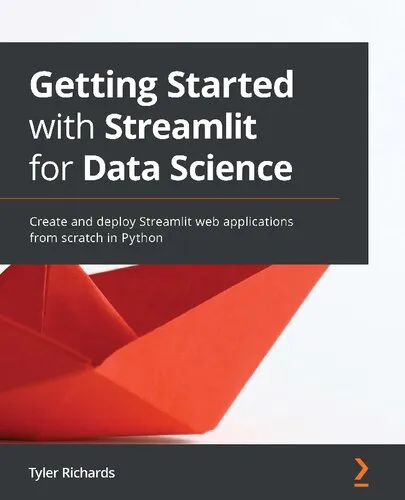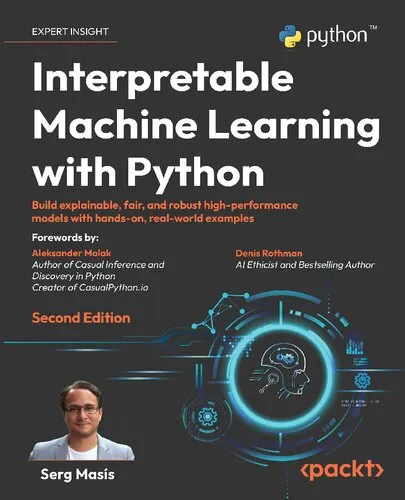Adaptive Learning of Polynomial Networks: Genetic Programming, Backpropagation and Bayesian Methods
4.7
بر اساس نظر کاربران

شما میتونید سوالاتتون در باره کتاب رو از هوش مصنوعیش بعد از ورود بپرسید
هر دانلود یا پرسش از هوش مصنوعی 2 امتیاز لازم دارد، برای بدست آوردن امتیاز رایگان، به صفحه ی راهنمای امتیازات سر بزنید و یک سری کار ارزشمند انجام بدینکتاب های مرتبط:
معرفی کتاب 'Adaptive Learning of Polynomial Networks: Genetic Programming, Backpropagation and Bayesian Methods'
کتاب 'Adaptive Learning of Polynomial Networks' که توسط نیکولایف ن. و ایبا ه. نوشته شده است، یک اثر منحصر به فرد و جامع در زمینه یادگیری ماشین است. این کتاب به بررسی و توسعه شبکههای چندجملهای تطبیقی (Adaptive Polynomial Networks) بر پایه روشهای نوین همانند Genetic Programming، Backpropagation و Bayesian Methods میپردازد. مخاطبان این کتاب افرادی هستند که در جستجوی تعمیق دانش خود در زمینه یادگیری تطبیقی و روشهای محاسباتی هستند.
خلاصهای از کتاب
این کتاب یک دیدگاه میانرشتهای و مدرن برای طراحی، آموزش و توسعه شبکههای چندجملهای ارائه میدهد. در ابتدا با معرفی مفهوم کلی شبکههای چندجملهای تطبیقی شروع میشود و سپس به بررسی جزئیات الگوریتمها و ابزارهای مختلف، مانند Genetic Programming و نیز مزایا و محدودیتهای این روشها پرداخته میشود. در ادامه، مراحل مختلف Backpropagation برای اصلاح وزنهای شبکه به طور دقیق شرح داده شده و مقایسه آن با سایر الگوریتمهای یادگیری ارائه میگردد.
علاوه بر این، تکنیکهای Bayesian Methods که رویکردهای احتمالاتی را در تحلیل شبکهها تسهیل میکنند، به نحو برجستهای بررسی شدهاند. نویسندهها تلاش داشتهاند تا پیچیدگیهای محاسباتی مربوط به این روشها را ساده کرده و به مخاطب امکان پیادهسازی عملی این تکنیکها را بدهند. با طی کردن فصول این کتاب، خواننده با ابزارهایی مجهز میشود که قادر است بهینهترین شبکههای چندجملهای را در مسائل مختلف طراحی و پیادهسازی کند.
نکات کلیدی کتاب
- تمرکز بر Adaptive Polynomial Networks: موضوع اصلی کتاب در مورد پروسه یادگیری و اصلاح خودکار این نوع شبکههاست که طراحی آنها نیازمند فهم عمیق از مفاهیم چندوجهی الگوریتمهای تطبیقی است.
- کاربردهای Genetic Programming: توضیح کامل از نحوه عملکرد و طراحی مدلهای شبکهای با استفاده از این تکنیک پیشرفته.
- استفاده از Backpropagation: ارائه دیدگاه عمیق نسبت به این روش کلاسیک، به همراه راهحلهایی برای رفع مشکلات رایج آن مانند محو شدن گرادیان.
- Bayesian Methods: بررسی دیدگاههای احتمالاتی در یادگیری ماشین و ابزارهای مدرن برای اعمال این روشها بر روی دادهها.
- آموزش عملی: ترکیب نظریه و عمل برای ارائه راهکارهای موثر جهت پیادهسازی آسان الگوریتمها.
نقلقولهای برجسته از کتاب
“The adaptive nature of polynomial networks allows them to model complex relationships within data with unprecedented flexibility.”
“Integration of probability and learning through Bayesian frameworks enriches the adaptability of machine learning systems.”
اهمیت این کتاب
کتاب 'Adaptive Learning of Polynomial Networks' به دلیل ارائه یک رویکرد جامع به یادگیری تطبیقی، جزو منابع کلیدی برای دانشجویان، پژوهشگران و متخصصان یادگیری ماشین محسوب میشود. این اثر نه تنها جنبههای نظری را پوشش میدهد، بلکه ابزارها و تکنیکهایی را برای پیادهسازی عملی در اختیار خواننده قرار میدهد. به دلیل استفاده از روشهای ترکیبی مانند Genetic Programming و Bayesian Methods، این کتاب به یک مرجع برجسته برای یادگیری مفاهیم پیشرفته تبدیل شده است.
اگر به یادگیری عمیق، تطبیقی و روشهای جدید یادگیری ماشین علاقهمندید، این کتاب یکی از بهترین گزینههای پیش رو برای یادگیری و پیشرفت در این حوزه است.
Welcome to the comprehensive introduction to Adaptive Learning of Polynomial Networks: Genetic Programming, Backpropagation and Bayesian Methods. This book explores the dynamic and powerful world of adaptive learning techniques, focusing on the development and optimization of polynomial networks through state-of-the-art approaches. By unpacking key methodologies like genetic programming, backpropagation, and Bayesian techniques, this work aims to bridge knowledge gaps and provide actionable insights for professionals, researchers, and enthusiasts in artificial intelligence, machine learning, and computational mathematics.
Detailed Summary of the Book
The central idea of this book revolves around the adaptive nature of polynomial networks in solving complex machine learning problems. Unlike traditional models, polynomial networks excel in expressing nonlinear relationships, offering an enhanced flexibility to capture intricate patterns in data. This makes them an essential tool for domains like deep learning, predictive modeling, and real-time decision-making systems.
Drawing from research and practical applications, the book is structured into three key parts:
- Part 1: Fundamentals of Polynomial Networks - This section introduces the mathematical and theoretical underpinnings of polynomial networks. Readers gain a foundational understanding of how these networks model relationships, the advantages they present, and their relationship to traditional neural network structures.
- Part 2: Adaptive Algorithms - This segment dives deep into the adaptive learning techniques used to optimize polynomial networks. It presents genetic programming as a creative and evolutionary approach, explores backpropagation as a cornerstone of gradient optimization, and tackles Bayesian methods for probabilistic adaptability.
- Part 3: Applications and Case Studies - The final part contextualizes the theories and algorithms covered earlier. It includes practical examples and case studies from domains such as robotics, predictive analytics, finance, and bioinformatics.
By weaving together these three parts, the book creates an engaging narrative of exploration, innovation, and application.
Key Takeaways
Whether you're a researcher aiming to improve predictive accuracy or a developer seeking to deepen your skillset in adaptive computing, here are the key lessons you’ll gain from this book:
- An in-depth understanding of polynomial networks and their potential in modeling complex, nonlinear systems.
- Practical insights into genetic programming, offering evolutionary perspectives for algorithm optimization.
- A clear breakdown of backpropagation, with an emphasis on its use in adaptive learning scenarios.
- Applications of Bayesian methods to manage uncertainty and enhance predictive performance.
- Real-world examples of polynomial networks being applied to solve intricate problems effectively.
Famous Quotes from the Book
"Adaptive systems are not merely tools; they are architects of solutions, evolving as the challenges evolve."
"The strength of a polynomial network lies in its ability to reflect the complexities of the world it learns from."
"Optimization is not a single step but a persistent dialogue between exploration, adaptation, and refinement."
Why This Book Matters
This book is essential for both academic and practical purposes. As machine learning continues to revolutionize industries, understanding and applying adaptive methodologies has become indispensable. The innovative frameworks provided in Adaptive Learning of Polynomial Networks empower readers to work efficiently with dynamic systems, make data-driven decisions with greater accuracy, and implement algorithms that evolve alongside ever-changing challenges.
Unlike other texts that focus solely on theoretical components, this book integrates practical applications and actionable tools, ensuring relevance to a wide audience. Whether you're venturing into genetic programming for the first time or looking to deepen your grasp of Bayesian methods, this work equips you with the knowledge required to excel at the forefront of computational innovation.
Machine learning and artificial intelligence are rapidly advancing fields, and this book provides a crucial foundation for staying ahead of the curve. The integration of polynomial networks with adaptive algorithms offers a framework that is versatile, insightful, and impactful—ultimately ensuring readers are better prepared to tackle both present and future challenges in adaptive systems.
دانلود رایگان مستقیم
شما میتونید سوالاتتون در باره کتاب رو از هوش مصنوعیش بعد از ورود بپرسید
دسترسی به کتابها از طریق پلتفرمهای قانونی و کتابخانههای عمومی نه تنها از حقوق نویسندگان و ناشران حمایت میکند، بلکه به پایداری فرهنگ کتابخوانی نیز کمک میرساند. پیش از دانلود، لحظهای به بررسی این گزینهها فکر کنید.
این کتاب رو در پلتفرم های دیگه ببینید
WorldCat به شما کمک میکنه تا کتاب ها رو در کتابخانه های سراسر دنیا پیدا کنید
امتیازها، نظرات تخصصی و صحبت ها درباره کتاب را در Goodreads ببینید
کتابهای کمیاب یا دست دوم را در AbeBooks پیدا کنید و بخرید






![The Ultimate iOS Interview Playbook: Conquer Swift, frameworks, design patterns, and app architecture [Team-IRA]](https://s3.refhub.ir/images/thumb/The_Ultimate_iOS_Interview_Playbook__Conquer__29925.webp)







